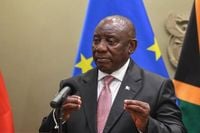The S&P Global South Africa Purchasing Managers' Index (PMI) fell to 48.3 in March 2025, down from 49.0 in February 2025, remaining below the critical 50.0 threshold that separates growth from contraction. This drop marks the second-lowest value since July 2023, highlighting ongoing challenges in the South African business environment.
Production volumes have steadily decreased, attributed to a decline in new orders, the completion of contracts, and weaker consumer spending. Notably, new order volumes have sharply fallen due to economic and political uncertainties. However, there has been a slight uptick in international demand, particularly from African nations.
David Owen, a senior economist at S&P Global Market Intelligence, stated, "The PMI figures for March confirm a full quarter of declining business conditions in the South African private sector." He pointed out that demand levels continued to drop in March, with some panelists citing uncertain prospects for domestic fiscal policy and global trade as contributing factors to lower business confidence and reduced customer spending.
On a positive note, input price inflation reached a five-month low. The rand's improved exchange rate helped mitigate cost increases from suppliers, resulting in a marginal decrease in sales prices for the first time since October 2024.
In a related development, South African President Cyril Ramaphosa addressed concerns regarding new tariffs imposed by the United States on South African imports. Speaking in Cape Town on March 13, 2025, Ramaphosa expressed that the 30% tariffs are troubling and underscore the urgent need for a new bilateral trade agreement.
The United States stands as South Africa's second-largest trading partner, with tens of thousands of jobs dependent on this relationship. The automotive sector, in particular, constitutes a significant portion of South African exports. Ramaphosa emphasized, "Unilaterally imposed and punitive tariffs are a concern and constitute barriers to trade and shared prosperity." He highlighted the necessity of negotiating a new bilateral agreement as a critical step to ensure long-term trade predictability.
In early February 2025, the Trump administration targeted the South African government by freezing aid and accusing it of implementing an anti-white land policy. This escalation included the expulsion of Pretoria's ambassador to Washington in mid-March 2025.
Amid these tensions, South Africa seeks to maintain the African Growth and Opportunities Act (AGOA), a trade agreement that provides preferential access to the U.S. market for many African countries and is set for renewal this year. In 2023, South Africa was the leading non-oil exporter under AGOA, with exports totaling $3.6 billion, a substantial portion of which came from the automotive sector.
Approximately 86,000 jobs are directly linked to AGOA among automakers, and this figure rises to 125,000 when including subcontractors. Furthermore, the U.S. has also implemented tariffs of 25% on imported automobiles, which took effect on April 3, 2025.
As these economic pressures mount, both the PMI decline and the new tariffs pose significant challenges for South Africa's economy. The interplay between domestic economic conditions and international trade relations will be critical for the nation's recovery and growth moving forward.
In summary, the latest PMI figures reflect a concerning trend in South Africa's economic landscape, compounded by the imposition of new tariffs by the United States. The need for a renewed focus on trade agreements and economic stability has never been more urgent, as the country navigates these complex challenges.




